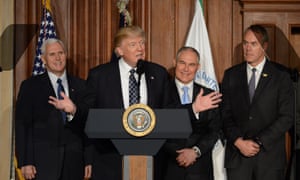On Tuesday, flanked by company executives and miners, Trump signed
an executive order to swiftly nullify Barack Obama’s efforts to combat
climate change. The clean power plan would have closed hundreds of
coal-fired power plants, frozen construction at new ones and replaced
them, in time, with wind and solar farms. Whether Trump withdraws from
the Paris agreement or not, he will all but guarantee that American
doesn’t meet the ambitious goals of the accord to drastically reduce
greenhouse gases and slow the warming of the planet.
Some sneer at the largely white and poor people who depended on coal for their livelihoods, but their distress is understandable. Morally bankrupt political leaders have lied to them repeatedly, blaming the Environmental Protection Agency for the vast decline of coal country’s fortunes. While Republicans deserve far more blame, Democrats in states such as West Virginia have encouraged this canard: all you have to do is deregulate everything, they say, and the boom times will return.
Even coal executives understand how simplistic this narrative really is. Competition from natural gas is the culprit for coal’s struggles. Renewable energies are gaining a greater market share. And automation at coal plants means fewer jobs for the working class, even when executives increase their profit margin.
Cheap natural gas has changed the energy landscape. New drilling techniques in shale fields across the country have lowered production costs and driven energy prices down. Hydraulic fracturing, where millions of gallons of sand, water and chemicals are pumped underground to break open rock and release gas, is driving this energy revolution – while also polluting groundwater.
There just isn’t a market demand for coal. Production peaked two
decades ago. Trump’s electoral sweep of Appalachia – in once Democratic
West Virginia, he crushed Hillary Clinton by 42 points – undoubtedly
motivated him to kill the clean power plan as quickly as he could, since
his voters are particularly desperate. Political leaders keep failing
them, and they want easy answers.
In the short term, Trump’s actions may make a slight difference. Share prices of energy companies soared this week. A few coal mines may stay open slightly longer.
But as with Trump’s Twitter bullying of companies to keep jobs in the US, stripping Obama regulations is no strategy for saving the jobs and towns of one of the country’s most economically depressed regions. America’s fraying social safety net and capitalism’s capriciousness punished coal country for decades, forcing poor people to rely on the whims of executives who once profited off the destruction of the planet.
Trump offers no serious hope for the millions of blue-collar workers who are losing their jobs to machines. Rather than shred environmental regulations, he can offer a vision for a future that is phasing out the reality of well-paid laborers with only a high school degree. A stimulus plan to put them to work elsewhere or even something akin to a guaranteed minimum income may be needed – not a shortsighted evisceration of what Trump Svengali Steve Bannon dubbed the “administrative state”.
When coal country keeps foundering, what will the loud-mouthed president say then? What lies will he proffer? Even his supporters deserve better.
Some sneer at the largely white and poor people who depended on coal for their livelihoods, but their distress is understandable. Morally bankrupt political leaders have lied to them repeatedly, blaming the Environmental Protection Agency for the vast decline of coal country’s fortunes. While Republicans deserve far more blame, Democrats in states such as West Virginia have encouraged this canard: all you have to do is deregulate everything, they say, and the boom times will return.
Even coal executives understand how simplistic this narrative really is. Competition from natural gas is the culprit for coal’s struggles. Renewable energies are gaining a greater market share. And automation at coal plants means fewer jobs for the working class, even when executives increase their profit margin.
Cheap natural gas has changed the energy landscape. New drilling techniques in shale fields across the country have lowered production costs and driven energy prices down. Hydraulic fracturing, where millions of gallons of sand, water and chemicals are pumped underground to break open rock and release gas, is driving this energy revolution – while also polluting groundwater.
In the short term, Trump’s actions may make a slight difference. Share prices of energy companies soared this week. A few coal mines may stay open slightly longer.
But as with Trump’s Twitter bullying of companies to keep jobs in the US, stripping Obama regulations is no strategy for saving the jobs and towns of one of the country’s most economically depressed regions. America’s fraying social safety net and capitalism’s capriciousness punished coal country for decades, forcing poor people to rely on the whims of executives who once profited off the destruction of the planet.
Trump offers no serious hope for the millions of blue-collar workers who are losing their jobs to machines. Rather than shred environmental regulations, he can offer a vision for a future that is phasing out the reality of well-paid laborers with only a high school degree. A stimulus plan to put them to work elsewhere or even something akin to a guaranteed minimum income may be needed – not a shortsighted evisceration of what Trump Svengali Steve Bannon dubbed the “administrative state”.
When coal country keeps foundering, what will the loud-mouthed president say then? What lies will he proffer? Even his supporters deserve better.

No comments:
Post a Comment